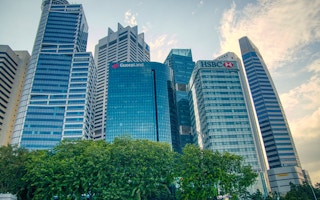Until recently, governments in Southeast Asia traditionally welcomed investments first and foremost solely on their potential to create jobs.
To continue reading, subscribe to Eco‑Business.
There's something for everyone. We offer a range of subscription plans.
- Access our stories and receive our Insights Weekly newsletter with the free EB Member plan.
- Unlock unlimited access to our content and archive with EB Circle.
- Publish your content with EB Premium.
The sustainability of the projects from an environmental, social and governance perspective was an afterthought, if a thought at all.
That began to change in 2015 with the adoption of the United Nation’s Sustainable Development Goals and each country setting their own targets to help achieve them.
In the Covid-19 era, governments throughout the region seem to be reverting to funding and approving infrastructure and commercial projects which aid economic recovery without as much concern for ensuring the sustainability of the projects.
Companies, however, do not seem to have taken that same trajectory and recognise that Covid-19 recovery plans must build back greener. While governments are preoccupied with short-term economic growth, companies need to satisfy their stakeholders over the long-term.
Pandemic-era projects not always the greenest
In the short-term, the pandemic may be undermining crucial green initiatives throughout Southeast Asia. In June, Vietnam approved a US$9.3 billion tourist resort that has been on hold for years due to concerns from climate activists that the development would harm a biosphere reserve protecting Ho Chi Minh City from pollution and natural disasters.
Meanwhile, the Indonesian government began development of a controversial food estate to shore up the nation’s food security, despite concerns from environmental groups over the project’s potential to trigger catastrophic forest fires. The food estate will span the archipelago in an area more than 10 times the size of Singapore. Indonesia’s recent landmark Omnibus Bill meant to improve ease of doing business and spur recovery from the worst recession it has experienced in over 20 years rolls back significant environmental management rules.
If such investments were to occur over a prolonged period, this could drastically impact a region already disproportionately affected by global warming. According to Germanwatch’s Global Climate Risk Index, Vietnam, Myanmar, the Philippines, and Thailand are among the ten most climate-vulnerable countries in the world. Temperature and rainfall irregularities not only threaten agricultural and fisheries sectors—the region’s economic cornerstones—they also make Southeast Asia less habitable.
A 2019 report from the United States-based nonprofit research group Climate Central estimated that rising sea levels will displace roughly 23 million Indonesians living in coastal cities by 2050. Floods have affected well over 20,000 Malaysians this year alone. Meanwhile, heatwaves aggravate public health conditions by fueling mosquito-borne disease transmission.
Governments again will meet their commitments
Tackling the climate challenge requires government commitment—and they will do so, even if they seem to be taking a short time out. The Association of Southeast Asian Nations (Asean) committed itself to the UN Framework Convention on Climate Change and the Paris Agreement through the Asean SocioCultural Community (ASCC) Blueprint 2025. The ASCC emphasises reducing deforestation-driven emissions and reimagining land transport with energy-efficient vehicles. It pushes for a 23 per cent share of renewables in the region’s energy mix by 2025.
As Asean economies progress, electricity demand skyrockets and sustainable projects will become even more critical. Vietnam’s energy consumption could grow by more than 40 per cent in the next five years. Thailand’s will rise by 75 per cent over the next 20. Society will require businesses to help to stave off the region’s growing reliance on coal and oil.
The Monetary Authority of Singapore, recognising that long-term and widespread environmental risks cannot be ignored by the financial sector, has called upon financial institutions to incorporate environmental risk assessment and management in their operations.
Businesses will not have the same luxuries governments do in moving forward with non-sustainable operations when their economic situation dictates them to do so.
Business becoming more sustainable
Despite the coronavirus’s economic burdens, private companies across multiple sectors continue to find ways to reduce their carbon footprint.
Southeast Asian businesses from Vietnamese Nike suppliers to agro-industrial Thai company Betagro invest in renewables to help cut electricity costs in the long-term.
Tech companies are among the private sector’s top energy consumers and must play a key role in Southeast Asia’s energy transition as the region’s digital economies boom. For example, in 2019 Google reported that it used 10.5 terawatt-hours of electricity, more than all the homes in Singapore.
Google announced in mid-September it will double down on climate and renewable energy commitments. By 2050, it aims to become the first multinational company to operate on clean energy “every hour and everywhere” and to support more than 500 cities to reduce one billion tons of CO2. Alphabet’s chief executive, Sundar Pichai, pledged to deploy Google’s artificial intelligence to support other industries in reducing their carbon emissions—adding to its mission to leverage AI to rethink healthcare and advance scientific discovery.
We Mean Business, a coalition of 1,300-plus major international companies with a combined market capitalisation of more than $24.8 trillion, pledged to reach net-zero carbon emissions by 2050. Chinese AI giant Baidu, Indian IT pioneer HCL Technologies, and Japanese household names Mitsubishi Electric and Mitsui Fudosan are members.
Walmart announced it will target zero emissions across its global operations by 2040, although it hasn’t rolled out targets for its “Scope 3” emissions produced by its suppliers and customers.
Setting ambitious targets to reduce their carbon footprint is increasingly something that companies are expected to do.
No time out from sustainability for business
Gone are the days of shareholder primacy when all that mattered were financial returns. In this new era of corporate sustainability, no issue unites stakeholders as urgently as climate change does.
While governments can take a time out from sustainability, companies cannot.
Eventually, Southeast Asian governments and the private sector will partner on changing how we power our homes and factories, build our cities, and feed and transport ourselves.
Businesses already transitioning to more sustainable operations will be ahead of the curve.
Steven R. Okun, the Asean representative for global industry association EMPEA, serves as a senior advisor for global geostrategic consultancy McLarty Associates based in Singapore. Julianna A. Lai of the firm’s Southeast Asia practice contributed to this article.















